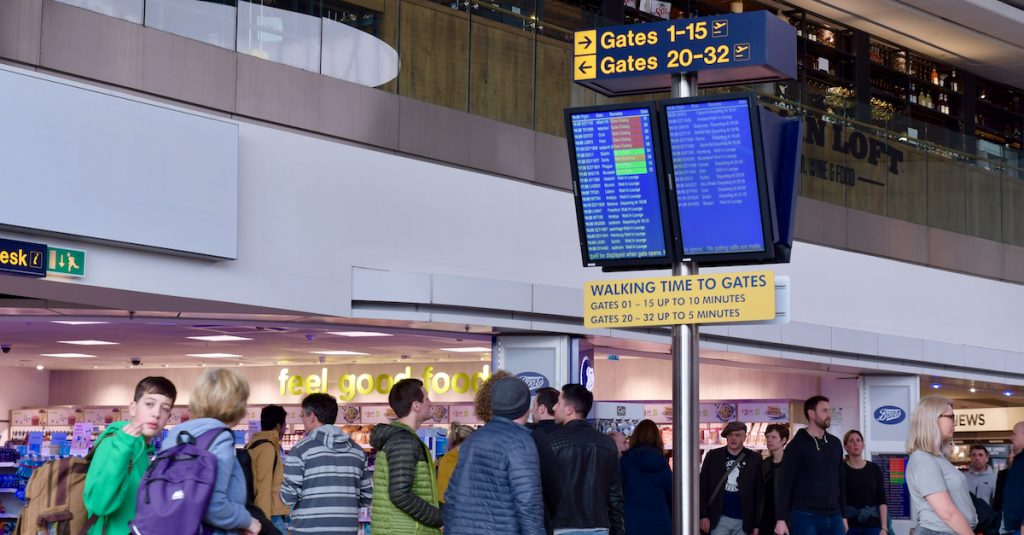A significant power outage at Manchester Airport on Sunday disrupted travel plans for thousands.
With over 90,000 passengers impacted, both airport and airline teams raced to manage the ensuing chaos efficiently.
Immediate Impact of the Power Failure
A significant power outage at Manchester Airport caused the cancellation of over 70 flights on Sunday, severely impacting operations. More than 90,000 travellers were affected by disruptions to security and baggage screening systems during the peak travel time. The airport’s managing director, Chris Woodroofe, expressed deep regret and extended personal apologies to all passengers impacted by the chaos.
The power surge disrupted essential equipment, rendering both Terminal 1 and Terminal 2 non-operational for aircraft departures and arrivals. Consequently, aircraft were unable to park, leading to widespread cancellations and significant inconvenience for passengers. Staff worked diligently to address the issue and restore normal operations swiftly.
Repercussions on Airline Schedules
Airlines, including Jet2 and Tui, warned passengers of continued disruptions and attempted to reschedule affected flights. The backlog of flights and stranded passengers required proactive rebooking efforts by airlines and travel agents alike. This collaborative approach aimed to mitigate further disturbances and ensure that travellers could proceed with their plans with minimal delay.
EasyJet reported that its services resumed by the afternoon, albeit with strict guidelines for passengers to confirm flight statuses prior to their arrival at the airport. Such coordination was crucial to managing passenger flow and preventing further congestion.
Challenges in Baggage Handling
Throughout the outage, the airport’s baggage system remained largely inoperative, exacerbating passenger frustration and complicating airline logistics.
Virgin Atlantic confirmed that its flights resumed operations but acknowledged a more congested airport environment. Airlines emphasized the importance of regular updates and communication with passengers to manage expectations effectively.
Staff were tasked with manually reuniting travellers with their baggage, a process which, while cumbersome, was essential to restoring passenger satisfaction and trust in the airport’s services.
Social Media Reactions and Criticism
Travel agencies worked relentlessly to rebook clients and provide necessary support amid the chaos. This dedication was crucial in alleviating stress for travellers whose plans were suddenly disrupted.
Industry experts, including Rory Boland from Which? Travel, underscored the legal obligations of airlines to care for affected customers, ensuring that their rights were upheld despite the challenges faced.
Airport’s Efforts to Rectify the Situation
The airport management swiftly moved to rectify the systems involved in the power failure, with assurances for passengers to continue with their travel plans as scheduled for the day following the incident.
Airlines and airport personnel coordinated closely, striving to prevent further setbacks and addressing the backlog of passenger queries and schedule adjustments in real-time.
Attempts for Transparency and Communication
Chris Woodroofe provided public apologies and outlined the technical issues faced during the outage, highlighting efforts made to restore full functionality at the airport.
Communication efforts remained central, with airlines such as Virgin Atlantic publicly addressing the disruptions and offering guidance for affected passengers. This transparency was vital in maintaining public confidence and support.
With increased call volumes, airlines encouraged passengers to seek information through online channels, relieving pressure on customer service teams and ensuring timely assistance.
Looking Forward
The Manchester airport incident has prompted a review of contingency planning, pressing the need for improved infrastructure and emergency protocols to safeguard against future disruptions.
The handling of the Manchester Airport power outage highlights the necessity for robust contingency plans and improved communication. By prioritising passenger welfare and maintaining transparency, airlines and airports can better manage unexpected challenges.

